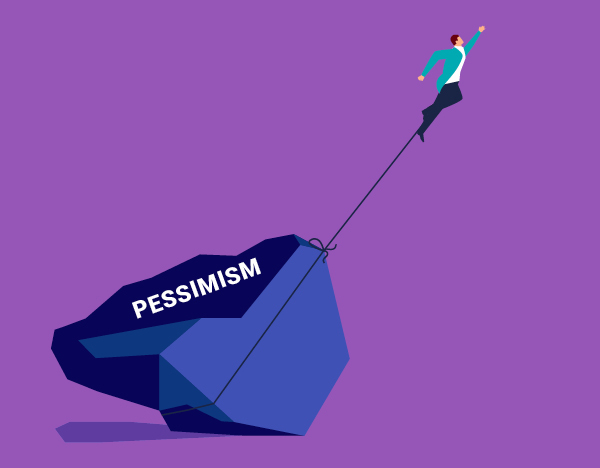Mindset can mean a lot at work. The attitudes or beliefs you approach work with can shape how productive and effective you are – and impact the experience of work for you and your colleagues.
We often look to attitudes that can help us work well or achieve – things like positivity or proactiveness. But perhaps less often do we think about the negative ones that make things hard for us.
Here are five mindsets or attitudes that could be holding you back at work, and ways you can reframe your thinking.
- The pessimistic mindset
Pessimism is a tendency to focus in on the negatives of a situation, or anticipate that the worst will happen: the ‘glass half-empty’ perspective. At work, a pessimistic mindset might cause you to see change or new events as a negative, or struggle to find a way to move forward when you’re expecting things to go wrong.
So, if you catch yourself thinking negatively about a situation at work, pause for a second to examine your thinking. Is there a way you can reframe it? Can you identify ways to turn a problem into an opportunity? This isn’t about being cheery for no reason, or not recognising the bad. It’s about giving yourself the chance to see positives or opportunities you can take hold of in any situation.
SEEK’s Resident Psychologist, Sabina Read, says learning to recognise unhelpful thought patterns and question them is one of the ways you can combat negative thinking about work.
- Letting your emotions take over
Emotions are part of what makes us human, and being open about how we feel can help us to communicate. But if emotions like anger or frustration see you lash out or lose your temper at work, it can lead to situations that negatively impact you and others – and that are seen as unprofessional.
If you’re having trouble handling strong emotions, it’s worth looking into methods to help you work through them. This might be as simple as focusing on deep breathing to counting to 10. It might be making an agreement with yourself to not answer an email right away when you’re angry. Or it might be taking time out from the situation, perhaps by going for a walk or by asking, I need a moment to think, can we come back to this later?
- Being unwilling to get along with others
Work can throw us into situations with people we’d never spend time with otherwise. And there’s no doubt working closely with people who have vastly different opinions or approaches to you can get frustrating.
Of course, you don’t have to become friends with everyone you work with, but a level of mutual respect and harmony is important. Disrespect, conflict or friction between you and your colleagues can make work less pleasant and productive – and it can impact how you’re seen professionally.
Personality clashes happen, Read says. But finding ways to work with someone you don’t like can include taking note of your differences to see what you can learn, ensuring your own needs are met, and focusing on the task at hand.
- An overly apologetic attitude
Do you find yourself saying ‘sorry’ at the drop of a hat? Apologising for things that aren’t your fault? Always starting with ‘I’m sorry to bother you,’ or ‘Sorry to ask’? Not only could you be constantly reinforcing to yourself that you’re at fault, you could also give others the impression that you’re lacking confidence, or even being insincere.
Read says over-apologising is often a reflex, and it’s worth delving deeper into why you’re saying sorry when it’s not warranted. Are you anxious about letting someone down? Fearing rejection, or worrying about being on the outer? In any case, the next step is to rework your response into something respectful and direct, but not apologetic when there’s no need. See more of Read’s advice on over-apologising and how to genuinely say sorry.
- Being resistant to change
Change can be hard to deal with – especially if it’s sudden or unexpected. But with shifts in the economy and technology happening faster and more often, change is almost unavoidable in our working lives.
If you find yourself thinking, ‘But that’s the way we’ve always done it’ or that you’re unwilling to try something new, it’s worth challenging that thinking. What opportunities could the change bring? How could you bring your skills to the table to best handle the change? Perhaps these are things you could talk through with your colleagues or manager.
Focusing on growth could also help. Read says resilience is a huge part of wellbeing at work, and resilient people have what is called a growth mindset, rather than a fixed mindset. People with a growth mindset look at what they can learn from challenges.
Ultimately, learning to recognise the negative attitudes or mindsets you might be holding onto can help you shift your perspective. This isn’t always easy, so don’t be afraid to ask for help – talking with friends or family, trusted co-workers or a professional could help you to catch an unhelpful negative mindset and reframe your thinking.



